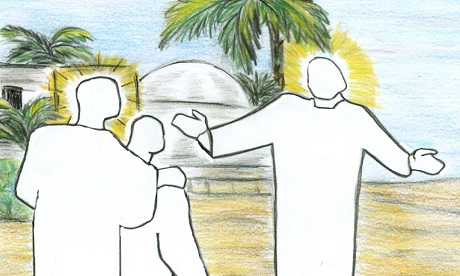

Service
Service was one of the most frequently used words used during the days of the Queen’s funeral rites.
The Queen’s service was honoured by those who walked for hours along the river Thames to Westminister Hall, those who carried her casket, and those who paid their respects in person or via television.
As the Archbishop of Canterbury reminded us: people who serve are remembered long after they have died, and people who do not serve are quickly forgotten.
Service and Christianity
Service is fundamental to the Christian vocation. In baptism, we have been anointed priests, prophets, and kings so that we can live the vocation to service. The baptismal call to service is given to the entire Christian community and shared by those who freely choose to join the community.
From the baptismal font to the Table of Eucharist, the call to service is nurtured and nourished every Sunday through receiving the Bread of Life and the Chalice of Blessing. Service goes out to the world from the assembly of the baptised faithful.
The Sacred Liturgy is the source of Christian service because it links our baptism to our reception of the Eucharist, builds our sense of community, and sends us out into the world. This is why the Mass does not have a final song. The Liturgy demands that we leave and become the Word of Freedom, the Bread of Life and the Chalice of Blessing to others.
Service by God, Service to God
Christian service begins in God and is sustained by God.
God, the Trinity, first serves us in the Creation, the Incarnation, the Resurrection, the Glorification of Christ, and the Final Judgement. We call this the Paschal Mystery. This is all “one thing” for God, though we tend to think about it in sequential units—it helps us understand how salvation history operates.
God serves us through the gift of salvation and redemption-in-Christ and through the Holy Spirit. All our service begins and is completed in the liturgical service we give to God.
In the Liturgy, we remember and give thanks for the service of salvation God is giving us. When we gather for the Liturgy, we give a service of thanksgiving to God for this gift; in our service to the world, we “pay forward” the service of God to the people who share the earth with us.
Liturgical Service
Liturgical service is multi-various—to people of all ages, to the scriptures, to the sacraments, to justice and more. The Liturgy spills out from the sacramental rites into people’s lives and through them into the world.
When the Liturgy is well celebrated, it is the most authentic pastoral work because it allows people to be touched by the divine. When people say, “wasn’t that a good funeral” the liturgical rites have opened up to them the mystery of their grief and given them the space to engage with it.
Community members give liturgical service to other members through leading children’s liturgy, taking communion to the sick and those at home, proclaiming the scriptures, providing and leading music, greeting people at the door, and so much more.
These are all volunteer roles. They are expressions of service, and everyone is called to do something, not sit there and be a consumer of other people’s generosity. It is not enough to turn up, give a donation and do nothing for the rest of the week. We are all in this together! We need people to step up and help.
From Liturgy to the World
The vernacular language of the Liturgy must flow out from the sacred rites into the sacred world.
Service is sent out at the end of the Mass—Go to love and serve the Lord—into the world. We serve others when we serve them using their language, speaking in ways they understand.
We do not serve when we impose our language or systems on those in need. We do not require an act of faith from a person who is starving before we feed them.
Our service is enfleshed (incarnated) in ordinary, sinful, redeemed and forgiven people who serve other ordinary, sinful, redeemed and forgiven people as an outpouring of their faith and thanksgiving.
Service like Liturgy is an Act of Thanksgiving
Like our liturgical service, our service in the world is an act of thanksgiving based on our memory of God’s service toward each of us within the community. Service and Liturgy constantly call us into the divine life and send us back to the ordinary, here-and-now world where God is met in those with whom we share the earth. When this happens, the Liturgy enhabits the world and becomes the source and summit of all the Church does. The Church becomes Christ missioned and acting in the world and can authentically share the hopes, dreams, pains, and desires of the people of the world and bring these back into the Sunday Assembly’s prayer.
Service and Prayer
When a Christian refuses to serve, when service is seen as oppositional to the Liturgy, when Christians serve but don’t join the community for the Liturgy, we have a major problem. When Christian service does not come from the Liturgy, the baptismal vocation never achieves its fullest expression because service must find its way back to the public prayer of the Church and back into its source of sanctification, the Eucharist.
For Christians, the Liturgy and Service must be intertwined. This relationship keeps our prayer authentic, real, and connected to the real experience of life; this relationship keeps our service grounded in the life of God, ensuring we serve as servants of others in the model and thinking of Christ, the servant-Redeemer.
Will you serve?
Service is a fundamental expectation of those who freely accept the call to baptism and the vocation of Christianity.
Following Covid, we need more people and new people to step up and offer themselves in service to the parishes.
We need people to take communion to the sick, others to visit those at home, parents to lead children’s liturgy and help with the sacramental preparation, people to build and maintain our pastoral telephone tree, musicians, readers and more. We need older people who have been serving for decades the opportunity to be served.
Will you help?


